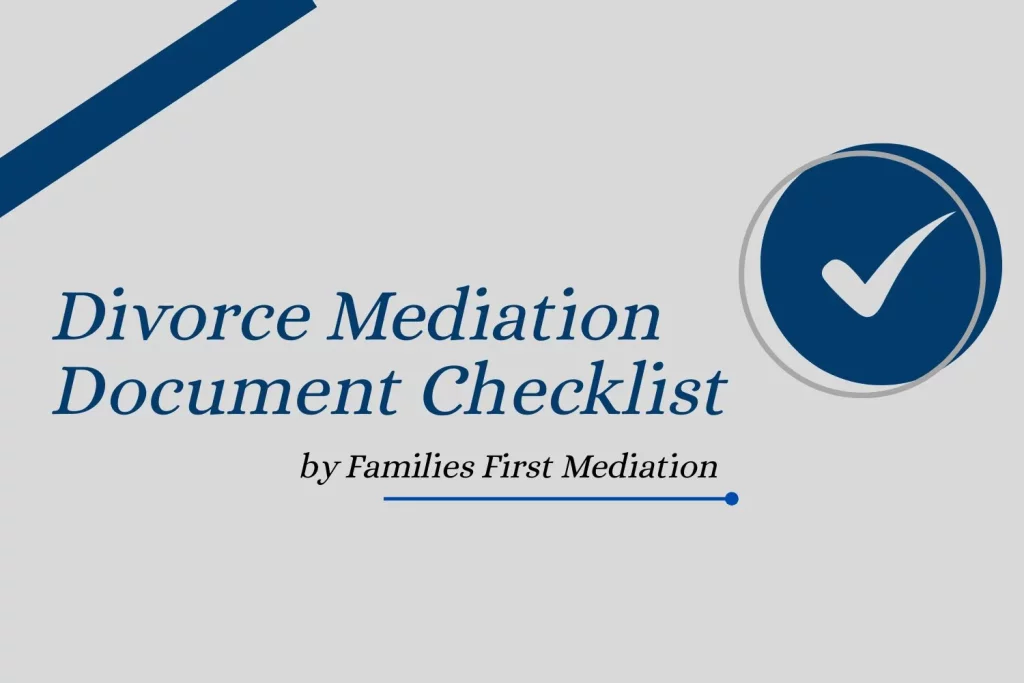Providing Divorce Mediation Services Throughout California
Providing Divorce Mediation Services Throughout California
Home » Divorce and Family law Blog » Divorce Mediation Checklist: 90 Items & with free PDF

Dina Haddad and her team provide expert mediation services for Californians. If you want help related to any family law issue, call us or book a consult.
Divorce mediation in California is a cooperative process, in-expensive, and less stressful process than divorce litigation and collaborative divorce.
Some couples that mediate generally have an idea of how to resolve their matter; and others, have many places of disagreement. In either case, the mediator is skilled to assist the couple to get through their divorce efficiently and effectively with a high-quality agreement at the end.
Our divorce mediators have prepared a 90 Item essential divorce mediation checklist that can help you complete your divorce process effectively and efficiently. This checklist outlines key topics and documents you will need for your mediated divorce.
At Families First Mediation, we also provide our couples a “Preparation for the First Working Session,” packet. This provides detailed instructions on how to prepare for the mediation; what documents are needed and how to disclose them; mediation ground rules; and even a secured location to upload the required financial documents.
Considering divorce mediation in California but unsure if it’s right for your situation or which path to choose? Schedule a FREE Divorce consultation with California’s top attorney mediator, Dina Haddad. She and her team would be more than happy to assist you.
Consider the following to decide if you should mediate?
Both my spouse and I are willing to attend.
We want to keep our matter private.
We want to stay in control of our divorce (and not give that power to a judge).
We are willing to communicate or negotiate with one another.
We want to save time, money and our resources.
Our printable, 90-item divorce mediation checklist can help you prepare better during your mediation session, leading to the productive and amicable divorce in California.
Divorce mediation can be an amazing way to resolve conflicts and find solutions to problems, but it’s not fit for every situation. If you want to know how divorce mediation compares with divorce litigation or collaborative divorce, please click the blue links.
Before you decide that you want to go through with mediation sessions, you might want to self-evaluate and find out if mediation is appropriate for your circumstances.
Factors like power imbalances, domestic violence, or other extreme situations can impact if mediation is the best choice or not. In some cases, more traditional routes would be more appropriate. To learn more about if mediation is the right path for you, read our article When Divorce Mediation is Not Recommended.
Before you get to your divorce mediation session in California, there are a few things you need to prepare:
As part of every California divorce, parties will need to prepare their financial disclosures.
Your mediator will provide these documents to you, including the Income and Expense Declaration, FL-150; and either the Schedule of Assets and Debts, FL-142, or the Property Statement, FL-160. As you prepare these forms, you will also identify what documents you need to provide as evidence of what you disclose on those forms.
If you have any questions about what else you should bring, you can contact your divorce mediator, and they can give you a more comprehensive list based around your situation.
Besides things that you should bring to your divorce mediation sessions, here is what you can write down in your divorce mediation checklist on things you will want to discuss:
Divorce mediation can be a bit more complex for parents who are also seeking custody mediation. Have a look at our blog Do’s & Don’ts of Custody Mediation to get an idea of the basics.
Custody arrangement: who will have legal and physical custody, make sure to let the mediator know of your preferences and why you prefer them.
Parenting Schedule:
Regular Schedule
Summer Schedule/Summer Vacation
Holiday Schedule
Child’s education: What does your school choice look like? If it’s not public school, what would be the costs? You can use mediation to discuss making this decision with your ex-partner.
Extracurricular activities: What kinds of outside of school activities will your child or children be participating in? What do the schedules look like and how will you split the cost with your co-parent?
Co-Parenting Agreements:
Introduction to romantic interests
Access to firearms in the home
International travel
Travel outside the state of California
Make up time (especially if you travel for work)
Access to child during non-custodial time such as reasonable video and phone calls
When you are addressing financial support in divorce mediation, you need to make a plan around child support and alimony (spousal support).
It isn’t just so that your ex-spouse has to pay you, it’s to ensure the well-being of your child or children, and help you maintain financial stability while you recover from the divorce.
Here is a checklist to guide your discussions:
Finances are a big discussion during divorce mediation. Your mediator will want to get you both to a place that you are equally well-off at.
This means that they will need to do a thorough examination of your financial situation. By providing these documents it will guarantee that your settlement is a fair one
Read More: 9 Asset Division Mistakes Californians Make in Divorce
Mediation is cheaper than litigation, but there are also reasons for higher fees. Below are some examples of why your bills could escalate:
The following fees may add to your mediation as well.
Mediators may recommend specialists for tricky situations. Book a FREE Divorce Mediation Consult and ask your mediator about extra fees (and whether the experts charge separate fees). A few moments of forethought can eliminate surprises to your budget. Some outside professional that can be a part of your divorce are:
Learn More: When is Divorce Mediation Not Recommended?